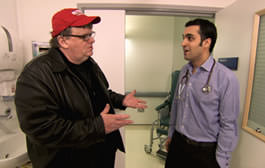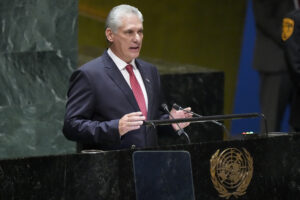Movie Review: Michael Moore’s “SiCKO”
After all the usual controversy that swirls around any film by director and rabble-rouser Michael Moore, and after all those stories about Moore taking 9/11 workers to Cuba for treatment, "SiCKO" is finally in theaters. Eunice Wong delivers her diagnosis for Truthdig.
“SiCKO,” Michael Moore’s latest film, will probably make you laugh. It may make you cry. You should leave the theater outraged. It is a powerful and often humorous indictment of our health insurance industry, riddled with corruption and pitiless abuse of the sick by rapacious, profit-mad corporations. But it is propaganda. In “SiCKO,” as in all his films, Moore violates the contract between reporter and audience: to tell the truth. His inaccuracies and lack of nuance give his detractors a glaring target to strike, making it easy for them to dismiss his message.
Michael Moore is an entertainer. He reduces complex issues to a vaudeville act with transparent villains and heroes. His goal is to amuse. Facts are malleable. He employs the techniques of advertising and propaganda, the same techniques that have corrupted our news and political campaigns. Truth and fiction blur at both ends of the political spectrum. You can believe what you want and discard what you don’t. This illusion of truth and knowledge is far more dangerous than ignorance. And although I happen to sympathize with Moore’s concerns, his methods only provoke the rupture of American society into two slogan-chanting camps.
In the film, Moore takes three small boats of sick Americans, including 9/11 volunteer rescue workers, to Cuba. They receive, at no cost, the medical treatment they have been denied at home. It’s a triumph of the socialized state.
“I asked [the Cuban doctors] to give us the same, exact care they give their fellow Cuban citizens. No more, no less. And that’s what they did,” Moore says.
The sick Americans, in a montage underscored by swelling cellos and a pensive piano, receive MRIs, dental exams, lung assessments and ultrasounds. All Cubans, the film implies, receive this kind of care. This is not true.
“The treatment Moore and the rescue workers receive in the film was done specifically for them, because they [the Cubans] knew it would make great propaganda,” Dr. Julio Cesar Alfonso, a Miami doctor who practiced medicine in Cuba for four years, said in a June 22 interview with The Miami Herald.
“The medical centers in Cuba that treat tourists and government officials and VIPs are very different than the ones that treat the general population,” Alfonso said. “If you’re a Cuban citizen and need a prescription drug, most doctors either tell you to ask your relatives in the U.S. to ship it to you or recommend alternative herbal remedies. That’s the degree of scarcity on the island.”
Life is not a Hollywood movie. A Cuban watching “SiCKO” would recognize this segment for what it is: agitprop.
The United States has sunk to No. 37 on the World Health Organization’s ranking of health systems. Moore’s camera pans down the list to zero in on the shameful No. 37. It slides too quickly for most viewers to catch that Canada is No. 30, and the frame stops just short of No. 39: Cuba.
There is, despite this distortion and omission of facts, much in “SiCKO” that is worthwhile. The film is strongest when Moore allows ordinary Americans to tell their heart-rending stories about the abuse they suffered in our profit-driven insurance industry.
Julie Pierce, a middle-aged woman seated alone in her Kansas City living room, struggles to contain her emotions as she talks about her husband, who had kidney cancer. His brother was a perfect match for a bone marrow transplant. These transplants can halt and sometimes eradicate the disease. An insurance company, however, denied the transplant, claiming it was experimental. Her husband died.
“He was my best friend, he was my soulmate, he was my son’s father. … They took away everything that matters. … You preach these visionary values, that we care for the sick, the dying, the poor, that we’re a healthcare that leaves no one behind. You left him behind. … It was as if he was nothing. And I want them to have a conscience about it and I don’t think they do.”
Moore also interviews those within the monolith. Linda Peeno, a former medical reviewer for Humana, says: “The very definition of a good medical director was somebody who could save the company a lot of money. … The doctor with the highest percentage of denial was actually going to get a bonus. Any payment for a claim is referred to as a medical loss. That’s the terminology the industry uses. When … you deny their care … you make a decision that brings in money … it’s a savings to the company.” This let-them-die-for-profit ethic is contrasted against the testimony of a British doctor interviewed later in the film.
“We get paid by what we do, so the better we do for our patients, the more we get paid,” he tells Moore in a hospital corridor. “If the most number of your patients have [desirably] low blood pressure, or if you get most of your patients to stop smoking, or you get most of your patients to have things like mental health reviews, or lower their cholesterol, then you get paid more.”
But, like the nightly news, Moore never allows us to linger too long on catastrophe. It might depress us, and the point, of course, is to entertain. When a Michigan woman poses as a Canadian in Windsor, Ontario, to receive medical care, Moore deadpans: “Yes, what Adrian was doing was illegal. But we’re Americans. We go into other countries when we need to. It’s tricky. But it’s allowed.” This fragmentation reassures us, as it does on television. Tragedy is always followed by a good joke. This discontinuity, while it amuses and diverts, damages our sense that the world is a serious place.
Moore’s manipulative use of music — “SiCKO” is almost entirely scored — provides the required emotional stimulation. The music imparts the pace, the mood, the energy of the film. Sometimes it is exciting and satirical. Heroic brass blares as the three intrepid little boats of Moore’s sick Americans, flying large American flags, streak southward to Guantanamo Bay, “the one place on American soil that still had free universal healthcare.” Suddenly canned elevator music and the seal of the Department of Homeland Security cut off the faux action movie. Sometimes the cue is maudlin, as when the sobbing violins of Barber’s Adagio for Strings underscore Linda Peeno’s harrowing 1996 testimony before Congress about the abuses of managed care.
“In the spring of 1987, as a physician, I denied a man a necessary operation that would have saved his life, and thus caused his death. No person and no group has held me accountable for this, because in fact what I did was save a company half a million dollars. … I had one primary duty, and that was to use my medical expertise for the financial benefit of the organization for which I worked.”
The music inevitably frames Peeno’s words as courtroom drama. There is no soundtrack in real life. No violins were playing when Peeno made her testimony. The music, ostensibly used to enhance the gravity of the situation, only prevents the audience from realizing the full, unadorned weight of reality.
Moore visits Canada, Britain, France and Cuba to compare the wreckage of the American healthcare system with these countries’ fairy tale dreams, in which “Everything is free!” He discovers that in a British hospital, money comes out of the cashier’s window rather than going in. Seated in a candle-lit bistro at a table of Americans living in Paris, he is overwhelmed, hands over his ears, by the incomprehensible lunacy of what they tell him of France: free healthcare, free child care, free college education, five weeks’ paid vacation, an extra paid week for your honeymoon, unlimited sick days, government-issued nannies, no, no, make it stop, make it stop!!!
The other countries are painted with broad, rose-tinted strokes. All the Canadians, British and French interviewed have nothing but praise for their national healthcare. There are no dissenting viewpoints, no investigations into the economics that make these systems possible.
There is an interview with a doctor in Cuba, Aleida Guevara, the pediatrician daughter of Ernesto “Che” Guevara, in which she wonders why an impoverished island nation is able to provide free healthcare for its citizens while the United States cannot. Cuba’s massive Soviet subsidies in the 1970s and ’80s of $4 billion to $6 billion annually, which kept the nation afloat and made this system possible, go unmentioned, as does Cuba’s subsequent decline once these subsidies ended with the collapse of the USSR in 1991.
The star of Michael Moore’s films is always Michael Moore. “SiCKO” at first seems to be the exception. His aw-shucks-gee-whiz persona doesn’t shamble into view until halfway through the film. The first half of “SiCKO” is stronger for his physical absence, allowing us to focus on the personal suffering caused by our dysfunctional healthcare system.
But Moore’s narcissism is given full vent at the end of “SiCKO.” He tells us, in a voice coy with false modesty, that he sent an anonymous $12,000 check to the man who runs “the biggest anti-Michael Moore website on the Internet” to pay his ailing wife’s astronomical insurance expenses. This allowed the man — whose insulting blog postings to Moore fill the screen — to keep the website going and “run [Moore] into the ground.” This would have been an admirable gesture if Moore had kept it anonymous. But if it were anonymous, it wouldn’t be admired. And Michael Moore’s films, however important their issues, are ultimately crafted to serve Michael Moore.
“SiCKO” In theaters June 29 Rated PG-13 Running Time: 123 minutes Written and directed by Michael Moore; edited by Christopher Seward, Dan Sweitlik and Geoffrey Richman; produced by Moore and Meghan O’Hara; released by Lionsgate and the Weinstein Co.
Eunice Wong is an actor based in New York City. She trained at the Juilliard School Drama Division and received the 2006 Helen Hayes Award for Outstanding Lead Actress.
Your support is crucial…With an uncertain future and a new administration casting doubt on press freedoms, the danger is clear: The truth is at risk.
Now is the time to give. Your tax-deductible support allows us to dig deeper, delivering fearless investigative reporting and analysis that exposes what’s really happening — without compromise.
Stand with our courageous journalists. Donate today to protect a free press, uphold democracy and unearth untold stories.









You need to be a supporter to comment.
There are currently no responses to this article.
Be the first to respond.